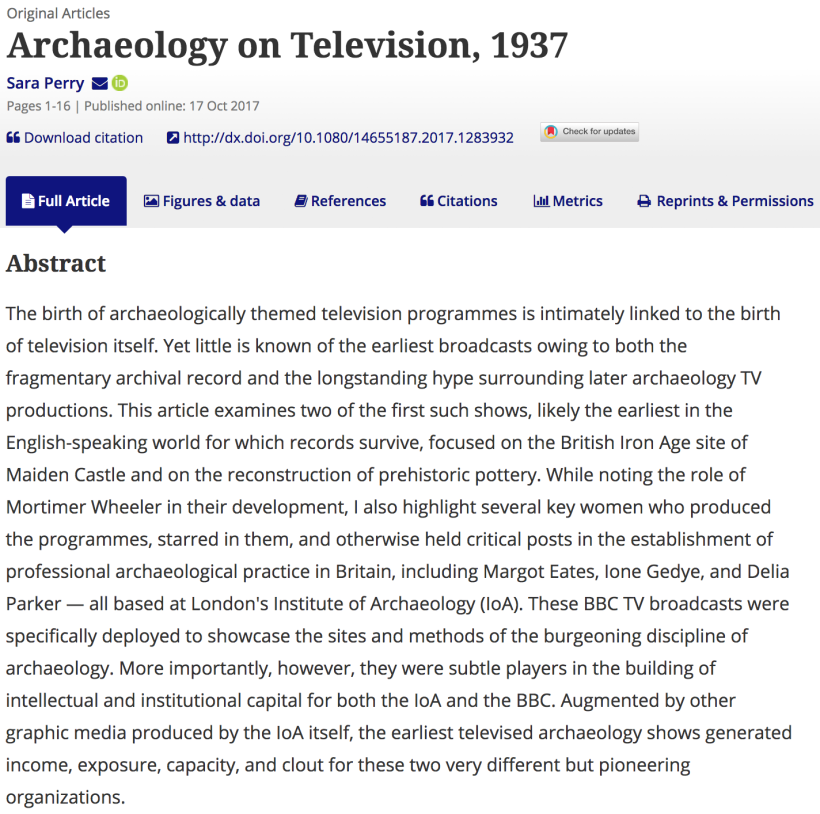I’m so pleased to announce that, more than seven years after discovering the records hidden deep inside the BBC’s archives, my research on the first-ever English-language archaeology TV shows (aired in 1937) has been published (free, pre-print version here)!
- Did you know that these shows were effectively 100% produced and starred in by key female archaeologists and TV producers of the time?
- Did you know that archaeology was one of the first subjects to air on television very shortly after the British TV service launched (November 1936)?
- Did you know that, at the time, archaeology was considered an experimental science, presented alongside other emerging — and, in some cases, now discredited — empirical research areas like palm-reading? (!)
No filmic records survive of these shows (because of the live-to-air nature of TV in the early days), and after weeks of searching through the BBC’s paper archives, I am fairly confident that no scripts survive either. What we do have access to are correspondences, the most fascinating of which include exchanges between producer Mary Adams and Mortimer Wheeler, and Wheeler and David Attenborough (then working behind the scenes in his early professional role for the BBC):
I don’t know whether you have seen a Television screen, but it is obvious that archaeological material has great possibilities for us. I would very much like to interest you in our work here, and to discuss with you what might be done (Adams to Wheeler, 13 May 1927, BBC WAC, TVART1, Wheeler Personal File).
I feel sure you will understand that having been lured into this business by the wiles of Mary Adams (bless her),* I was amused to have some small share in it during the formative stage. But going on with it indefinitely now that it seems to be more or less established is another matter (Wheeler to Attenborough, 8 Sep 1953, BBC WAC, TVART1, Wheeler Personal File).
*Note that, based on my familiarity with the subject matter & archives, feel this reference to Mary could be interpreted as condescendingly gendered.
As well, we have access to records of anticipated camera angles and filmic sequences for some of the shows (see here to access imagery).
There is so much fascinating insight here into the early days of both archaeology and TV, including the fact that they each arguably depend on one another to varying degrees to emerge and establish themselves as (public) services.
I’ve copied the abstract from my article below:

You can access a pre-print PDF copy of the article here:
Or don’t hesitate to email me and I’ll send you the final print version.
I’m indebted to many people for supporting me in this research, which was conducted as part of my PhD and generously funded by a Doctoral Fellowship from the Social Sciences and Humanities Research Council of Canada (2007– 2010) and an Overseas Research Student Award from the Higher Education Funding Council for England (2007– 2010). Thanks especially to Jamie Larkin for his editorial wisdom and Pamela Jane Smith for being endlessly supportive and ever-inspiring.
This is fascinating Sara, thanks for posting a readable copy of the paper too. I’m curious as to why you put ‘first English-language archaeology TV shows’ – do you know of earlier ones in another language?
Thank you so much :) I really appreciate your kind words! I’ve written it as English language as I’m not entirely sure whether I can be confident in saying that they were the first in the world. Germany’s TV service was active before the BBC, and although I’m not aware of German Archaeology-related programmes, I feel it’s possible these could exist and would be worth investigating further.
Just a note too, if you’re interested: the journal has made the article free access to all via this link – bit.ly/2l9TieO
Thank you for posting I really enjoyed reading this. nice one – Calum